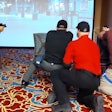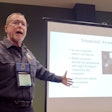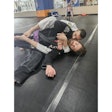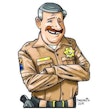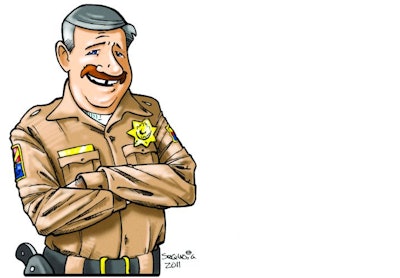 Illustration by Sequoia Blankenship.
Illustration by Sequoia Blankenship.
One of the first things that becomes apparent when I review dash cam footage of incidents is how much vulgarity spurts out of our little brains under stress. It has long been said the last two words on the black box recorder from crashed aircraft are "Oh shit!" and after observing hundreds of high stress moments on video, I know crime fighters blurt out their fair share of expletives. Why? I mean, we know it looks bad, is often against policy, and can certainly make the courtroom an embarrassing place to testify, so why do we do it?
According to Harvard's Dr. Steven Pinker, taboo words are linked deep inside our brains, closer to our emotional centers than to our rational language centers. Therefore these words have remarkable emotional power in conversation. You can't read or hear one of these words—usually related to bodily functions, or religious images or figures—without an emotional response of some kind, whether negative or just intense.
The existence of taboo words is universal, but ironically the words themselves are very culturally specific. Someone swearing in Britain may elicit a very slight response from someone listening in America and vice versa. But every language and culture has these words, these tools that serve many purposes, from conveying emphasis, to anger, to horror.
I myself, gentleman to the end, have blurted out a spontaneous vulgarity (or 10) in the heat of the moment, or in terror. It seems we swear in a variety of situations and my advice is to never deny the words, but rather explain the emotion.
Did you use a taboo word that had no other reason to be in a sentence than to offend? No, you told the subject to get on the "f—king ground" not because the ground was actually doing anything but lying there, but rather because your pucker factor was climbing into the high nineties and you wanted to give a sense of sincerity and intensity to your sentence. If the good doctor is right, the greater your anxiety and stress the more intense the taboo word might be for you. Granted, intensity is in the eye of the beholder, just as it is between cultures.
In the calm tranquility of an office, a report of an officer telling a fellow to copulate with himself as he struggled for the officer's gun might not capture the true emotion of a crisis, while those at the scene might not have registered any words at all, just the intense emotions of the conflict, the emotion the words both triggered and reflected.
In fact, imagine a scene where two officers have suddenly been confronted by a knife-wielding fellow in a bar. "You brigand, drop thy blade!" will not be found in the report or memories of those present since no one would say it. It carries no weight, no intensity, no emotion, in what is a remarkably intense moment. This is a situation where language gives you the tools to have your lizard brain talk to his lizard brain in a way that makes it plain that he doesn't get to stab anyone, or even keep his friggin' knife. See, I added "friggin'" and look how much more intense the sentence was.
So we all know swearing has a place, but when and where? When we talk to each other we often use expletives freely, or maybe not at all, depending on the subject, the location, or our mood. On the job we know we should project a professional demeanor, and regionally the standards of what is taboo and what isn't changes; but if the situation is so intense, the pucker factor so great, that your emotional brain drops an f-bomb or two or an Adam Henry or three, don't deny it; describe it.
In court, explain how you felt, the fear, the intensity, the emotion of a sudden confrontation, a terrifying moment when a drunk driver skids by only a few inches from you, causing an utterance that would make a sailor blush.
If you are a supervisor, explain to your people that even if you can't explain an expletive enough to justify it, lying about it will be far worse. This is just one of those times when you have to simply take your medicine.
My wife, the Sarge, once took a day off for using a taboo word. She said it, she confessed it, and she took her time, but she still talks like she was the one in the Navy, not our son. We have some powerful words that let us express ourselves at the deepest emotional level … we just need to do it carefully.
Dave Smith is an internationally recognized law enforcement trainer and is the creator of "JD Buck Savage." You can follow Buck on Twitter at @thebucksavage













